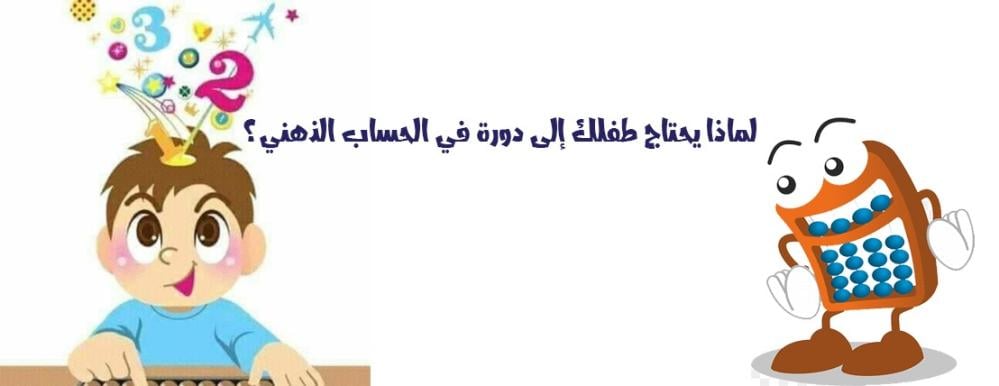
🧠 Why Does Your Child Need a Mental Math Course?
Your Complete Guide to Understanding the Importance of Mental Math for Your Child’s Cognitive Development
In a world where mental agility and quick thinking are key to success, mental math courses have emerged as one of the most effective tools to sharpen children’s minds and stimulate their intelligence.
But the important question many parents ask is:
Does my child really need a mental math course? Will it affect their academic performance or behavior?
In this comprehensive guide, we answer all your questions and more, explaining the benefits of mental math, how to choose the right course, and the results you can expect to see in your child after training.
❓What is Mental Math?
Mental Math is the ability to perform arithmetic operations (addition, subtraction, multiplication, division) without using a calculator or pen and paper. Instead, children rely on mental thinking and specific techniques such as:
- Using the Japanese abacus (abacus)
- Visualizing math problems
- Strategies like breaking down and regrouping numbers
- Speed and accuracy in calculation
🎯 What is the Goal of Teaching Mental Math?
The main goal isn’t just “teaching math,” but developing deep mathematical and logical thinking by:
- Enhancing logical and analytical thinking
- Improving focus and attention
- Boosting self-confidence
- Enhancing overall academic performance, not just in math
🧒 Who Needs a Mental Math Course?
Every child can benefit from mental math, but certain groups see even greater gains:
- Children aged 5 to 14: Their brains are highly flexible and imaginative.
- Children with concentration issues: Mental math boosts focus and stimulates the brain.
- Gifted children: Helps develop advanced thinking skills.
- Children struggling with math: Offers fun and accessible ways to learn math.
❓How is Mental Math Different from Traditional School Math?
There are key differences between mental math and traditional school-based math:
Children aged 5 to 14: This age range is a critical stage when the brain is highly flexible and imaginative, allowing children to gain the most from mental math techniques.
Children with attention difficulties: These courses help enhance focus and stimulate the mind through engaging mental exercises.
Gifted children: They provide a stimulating environment to develop higher-order thinking skills, such as quick analysis and problem-solving.
Children struggling with mathematics: Mental math offers fun and easy methods to learn mathematical concepts, moving away from traditional approaches that may feel boring or difficult.
✅ What Are the Benefits of Mental Math for Your Child?
- Stimulates Both Brain Hemispheres
- Activates both left and right sides of the brain for overall brain development.
- Increases Mental Agility
- Improves quick thinking and fast decision-making in and outside the classroom.
- Builds Self-Confidence
- Solving complex problems quickly gives children a sense of achievement and boosts self-esteem.
- Improves Academic Performance
- Not only in math, but also in other subjects requiring focus and memory.
- Prepares for International Competitions
- Many mental math programs offer local and international competitions for motivated learners.
📌 Are There Scientific Studies That Support This?
Yes. Multiple studies show that children who undergo mental math training:
- Score 30% higher in problem-solving skills
- Show marked improvement in school grades
- Have 25% greater focus compared to their peers
❓What Types of Mental Math Courses Are Available?
There are several course formats to suit different needs and preferences:
- Online courses (via Zoom): Ideal for home-based learning with flexible scheduling.
- In-person courses: Great for kids who thrive in interactive settings; typically 12–24 sessions.
- Intensive bootcamps: Designed for summer breaks or pre-school year; daily sessions for a week.
- Trainer courses: Tailored for parents or teachers interested in teaching mental math; typically 5–10 sessions.
✍️ What Does the Child Receive at the End of the Course?
- A certified diploma (from a training center or global body like STIM)
- A development report showing progress and strengths
- Opportunities to compete in international contests
- A lifelong skill that supports academic and personal success
🏫 What Does Jeel Alpha Offer in Its Mental Math Courses?
Jeel Alpha is a leading provider of mental math programs and offers:
- Direct supervision from the international STIM Foundation
- Training in abacus and mental visualization techniques
- Multiple levels: beginner – intermediate – advanced
- In-person and online classes
- Special programs for both boys and girls aged 5 to 14
🔍 Sample Course from Jeel Alpha:
- Course name: Intensive Mental Math Course
- Duration: 7 training days
- Hours: 2 hours daily
- Time slots: 11–1 PM, 2–4 PM, or 4–6 PM
- Certificate: Accredited by STIM
- Price: Varies based on course level and duration
❓Are There Any Challenges in Learning Mental Math?
Yes, such as:
- Difficulty in visualizing numbers at first
- Short attention span during sessions
- Confusing hand movements and number patterns early on
✅ But these can be overcome through:
- Repetition and daily exercises
- Support from family and trainers
- Use of games and interactive learning tools
💬 FAQs About Mental Math
Q: My child doesn't like math. Is this course still suitable?
A: Yes! Mental math is fun and imaginative — nothing like boring math drills.
Q: What is the ideal course length?
A: 12 to 24 sessions build a strong foundational skill set.
Q: Can I teach my child at home?
A: Yes, but it’s best to begin with a certified instructor before practicing at home.
🎁 How to Motivate Your Child for Training
- Give them a progress journal to track learning
- Offer small rewards for improvements
- Let the whole family participate in math games
✨ Conclusion: Is Mental Math Really Worth It?
Absolutely!
Enrolling your child in a mental math course gives them:
- An active mind
- Faster decision-making
- Greater self-confidence
- A competitive edge locally and globally

